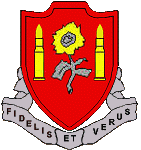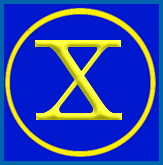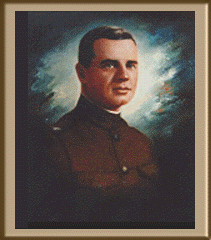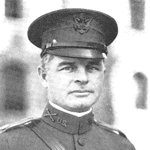


COL Charles Dudley Daly
1880 - 1959
Commander of the 29th Field Artillery
Camp Funston, KS, World War I Era



Charles Dudley Daly was born October 31, 1880, in Boston, MA. He passed away on February 12, 1959,
in Pacific Grove, California, at the age of 78.
He attended Boston Latin School where he was a track and football star. He entered Harvard
at the age of 16 and became a legendary quarterback on the Harvard football team. He
was graduated from Harvard among the Class of 1901 with an AB degree. At the suggestion
of President Theodore Roosevelt, an enthusiastic fan, he went on to West Point, from which
he graduated in 1905.
By 1906, his family was in need of financial assistance, and he assumed the responsibility
by resigning his commission in that year and going to work in Boston as a bond salesman
with the firm of F. S. Mosley & Co. With the income earned in that job he helped support his
family.
In 1910, John F. "Honey Fitz" Fitzgerald was Mayor of Boston and was in need of a clean cut,
untarnished figure for Fire Commissioner of the City. He offered the job to Charles, who took
it on August 18, 1910, on condition that he would be his own man and not be subject to political
pressures or influences. However, it soon became apparent that Honey Fitz had no intention of
keeping the bargain. He demanded that Charles use the Department for personal favors like pumping
out flooded basements for cronies, looking the other way on contract kick-backs, etc. The growing
estrangement from Honey Fitz came to a head over the latter's insistence upon Charles's ordering
John J. Carney (sometimes spelled Kearney), a firefighter who had contracted tuberculosis, to be
added to the pension rolls. Charles defied Fitzgerald, feeling that he was not entitled to share
in the retirement benefits since the Department Physician had declared that Carney's condition was
not job related. The political forces arrayed against him, however, were overwhelming. To complicate
matters more, the Massachusetts Legislature by special Act at Fitzgerald's request included Carney
on the retirement rolls. This further weakened Charles's position. On January 26, 1912, Fitzgerald
called him into his office and, after a short diatribe, fired him. There was a great deal of criticism
of Fitzgerald for his action. Charles made a public defense in which he excoriated Fitzgerald for his
attempt to corrupt the Department. The whole episode caused a great stir in Boston. It even pushed
the great Lawrence Mill strike off the top headlines. To most right thinking people, he came out
of it as the honest public official done in by the corrupt political machine.
Charles had courted Rose Fitzgerald, Honey Fitz's daughter, later mother of President Kennedy, and everyone
assumed that they would marry. The dispute with Fitzgerald probably ended his relationship with Rose.
In any case, he married Beatrice Jordan on Friday, November 29, 1912, in Boston.
On March 4, 1913, by Special Act of Congress and again at President Roosevelt's request, Charles was
re-commissioned a lst Lt. and re-entered the army. Getting back into the Army, however, was not easy.
James Michael Curley, then a congressman, fought the Bill intensely and "scored him (Charles) in
unmeasured terms" on the House floor, insisting that he had failed at whatever he tried in life and was
not the sort of man the Army wanted. He recalled the Carney case and his dismissal from the post of
Fire Commissioner, but Representatives Peters, Murray, Gardner and McCall spoke with equal vigor for
him. The Bill was passed by a narrow margin in the early morning hours just before the close of
62nd Congress and signed by President Taft the next day.

During the First World War, Charles was a Temporary Full Colonel and served as Director of the Army School
of Fire. In 1920 he returned to the rank of Captain. He also served in various other commands, among which
were the 338th Field Artillery; he was Commander of the 29th Field Artillery; he was stationed at
Camp Dodge, Ft. Sill, Ft. Sam Houston, Schofield Barracks, Army War College, Ft. Levenworth, Harvard College
(ROTC) and West Point.
While an undergraduate at Harvard he was asked by President Roosevelt to help strengthen the West Point Team.
Charles responded by coaching the West Point Team during the summers of his last two years at Harvard.
When he went to West Point as a Cadet, he did so with the understanding that he would be expected to
play for one year only. He played during the 1901 season when, incidentally, they lost to Harvard 6 to 0.
The Corps of West Point prevailed upon him to play again in 1902, which he did. The remaining two years he
coached the team. In 1907 and 1908 after his resignation from the Army he coached the backfield at Harvard
under Percy Haughton. When he returned to the Army in 1913, Charles coached the Army team every summer and
fall (except during the War) until 1922 when he asked to be relieved to concentrate on his work in the
Department of Tactics at the Academy.
At West Point he coached many of the great men of the 20th Century, Eisenhower, Bradley, Stillwell, Ridgeway,
Van Fleet, Patton and others. In 1925 he was again assigned to the Military Department at Harvard and coached
the backfield that year for Coach Robert Fisher. He was elected to the National Football Hall of Fame on
November 3, 195l, as an All American Back for the years 1898, 1899, 1900, 1901 and 1902, the only football
player ever to be thus honored five times.
In 1921 he founded the American College Football Coaches Association which honored his memory in its 1941 Annual
Meeting Report in these words:
"Colonel Charles Dudley Daly, the first and only player ever honored All-American five times, is listed among the
all time football greats of both Harvard and Army."
On November 3, 1963, West Point honored his memory by naming the varsity practice field in his name.
Top Photograph Courtesy of COL (Ret) Bob & Carol Totten, with many thanks!
Bottom Photograph Courtesy of the United States Military Academy at West Point, with our thanks!
Biography, in part by Paul T. Ford, and his geneology website:
The Descendents of Crohan Daly In America- Chapter IV.
